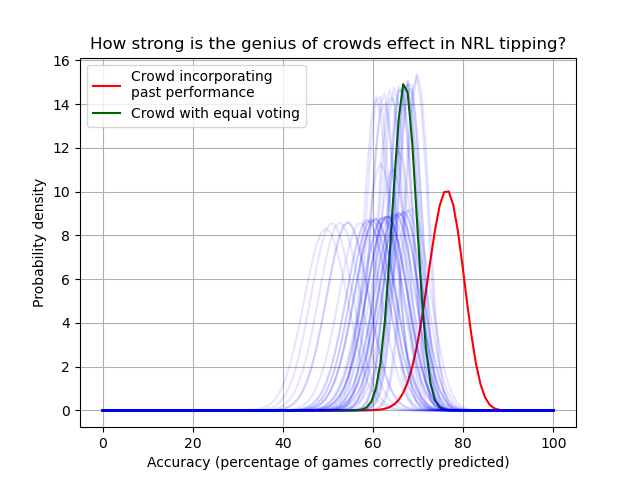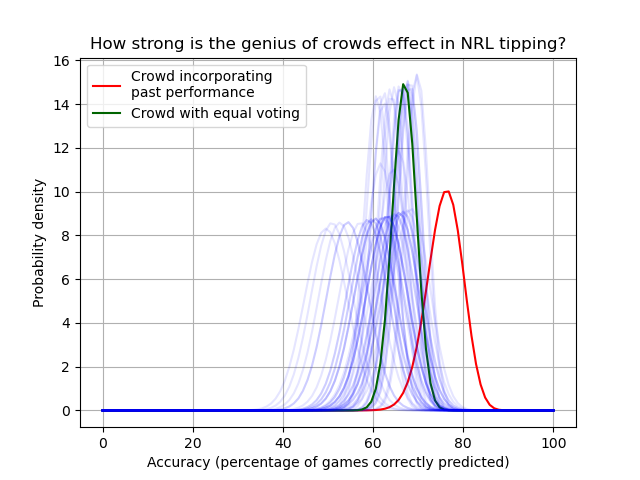
What NRL tipping competitions tell us about being a better manager
If you have a tipping competition at your work and you look closely at the data, you will see a genius of crowds effect happening - and that should shake up the way you do leadership, make decisions and engage employees.
There's a lot to unpack in that sentence. But a warning first: once you see it, you can't unsee it and you will start wanting to insert prediction markets in everything you do.

Rugby is a relatively high scoring game (e.g. compared to soccer) which means that luck plays less of a role in victory. In soccer if your goalie slips in the mud at the start of the game and lets one through, the other team can play a strong defensive game and win 1-0 even if they were much weaker than your team. In rugby, there's less of an effect. Luck still plays a part: an injury to a key player at the start of the game could weaken a strong team, and one successful tackle at the right time can make all the difference to an outcome, but at least 75% of the time you can size two teams up and predict what's going to happen correctly.
Let me put it another way. If you can't get this weekend's games right 75% of the time, you are biased. Of course, you probably have more fun watching (or playing!) if you are terrible at predicting the outcome ("wow, we won, I never saw that coming!"), so don't feel bad about it. Just use some self-reflection and don't try to gamble against people who are genuinely good at it. Relying on just your own intuition is not a good strategy.
Teams are always changing. Knowing what happened in Cronulla vs St George last year doesn't say all that much about this year's match. I had a student a few years ago who built some software for predicting rugby outcomes which worked pretty well, but the problem he had is that machine learning can only ever be backward looking. Software can't predict the effect of adding an unknown new player to a team if that player brings something unique to their game. Only human beings can do that.
How to win
Let's be competitive! The game itself is competitive, so let's try to win at the tipping competition.
I grabbed a data set from https://mysportstips.com.au/ (thanks Gavin!) to test out various approaches, and see how we could do against fans of varying levels of ability.
If you can assemble a brains trust of 20 people, you can hit 67% accuracy by taking the majority opinion. If 11 or more think Manly is going to win this weekend, make that your tip. You'll do better than 4 out of 5 of your colleagues just with this simple approach.
You need a lot of diverse opinions who all feel safe telling the truth - so this won't work if you get your brains trust entirely from Parramatta Leagues club, for instance, because not many people will be willing to say out loud that Parramatta is going to lose, even if it's obviously going to happen.
So you'd like your brains trust to tell you secretly, and have some sort of incentive for giving it their best shot: maybe some sort of cash reward.
The problem though is that you'll have some really good, knowledgeable people in your brains trust, and you'll also have some duds. Like my dear friend Pastor Ray who would predict that the team that was alphabetically first would win. When that didn't work he tried predicting that every home team would win.
Anyway, here's a fun idea: maybe you could have a tipping competition where you got to say how confident you were in your prediction as well as who you thought was going to win. I'll leave that up to someone else to try, but I'd love to hear how it goes for you.
You can do the next best thing though. Instead of taking a simple majority vote, you can look at how well people did in the past, and give more votes to people who have a good track record.
So I did that analysis too, using the 2023 results. That gets you to 76% accuracy, which is well ahead of the best human tippers.
The crowd is smarter than any individual.

There's some personal information in the https://mysportstips.com.au/ data, so I can't release the analysis. But it's easy to reproduce if you don't believe me. Open offer: if you have a sports tipping competition (any sport) in your company with a dozen or so participants, I'll analyse it for free and show you the underlying genius of crowds effect.
Applying this to business
You can't eliminate luck from business outcomes: maybe your best salesperson ended up in hospital at the start of the financial year, and you're going to be behind the competition even though you have the stronger product and the stronger team. But it's not all luck. Most of the time, it's pretty predictable.
You should be able to tell which accounts you are going to win, or what new feature to build, but if you use some self-reflection, and you'll realise that you are probably biased. It might be why you have so much fun at work: every day comes as a surprise! Anyway you shouldn't be gambling outcomes against people or companies who are less biased. Relying on just your own intuition isn't a good strategy.
Relying on ChatGPT for your business strategy decisions (admit it, you've asked it too, haven't you?) is a really bad idea too. It can only offer backward looking advice for events leading up to its cutoff in 2021. It will work really well (better than most people) for a while, until the next major change in your industry, and then it will be useless.
If you want to be competitive, you could try asking for a majority vote from your team or some other brains trust, but you have to make sure you've got a sufficiently diverse workforce who feel safe about telling the truth about what they think will happen. If you've set a KPI of hitting a 10% growth this quarter, it might be career limiting for an employee to say out loud that it's hopeless, so asking for a show of hands at a meeting isn't going to give you the information you need.
You could do a secret poll, but you'll need some incentive for people to put in their best guess. Maybe you should add in the option for them to say how confident they are of their prediction.
Putting my money where my mouth is
Did you notice anything repetitive? The section about business decisions was basically the same as the section before about tipping the NRL. It's more than just a metaphor. If you believe that there's a genius of crowds effect in NRL tipping -- and you should believe it, the effect is there, it's really easy to show! -- then you should also believe that there's a genius of crowds effect at work in business.
The most successful businesses of the 21st century will make use of genius of crowds effects: they will outperform any artificial intelligence, and they will substantially outperform companies that rely on an individual's biased intuitions.
That's why I'm building genius-of-crowds.com of course.
Let me put my money where my mouth is. I have some decisions I need to make, and I'm interested in growing the customer base for genius-of-crowds. The crowd is smarter than I am, so here are this month's prediction competitions.
I'm putting up a reward pool of AUD100. If you aren't in Australia, you are welcome to compete, but be aware that if you do well, I might not be easily able to send you your money without a lot of fees being taken out.
- The website ( https://www.genius-of-crowds.com/ ) isn't very good at the moment, so I could make some explainer videos, update the content to talk about prediction markets for product managers, clean up the design and run some ad campaigns. If I make a major focus for July to be working on my marketing, how many customers will I get in August 2023?
- One of the things I've discovered in interviewing companies that have used prediction markets in the past, is that friction is a major issue. People won't exert any effort unless the prize pool is huge, so companies run out of decisions that are high enough value quite quickly. But I have some code for doing very smart handling of emails (see https://industrial-linguistics.com/ ). If I make a major focus for July to be working on an interface so that people can make predictions via email, create their own markets via email and make for the silkiest, smoothest, low-friction user experience I can build in a month, how many customers will I get in August 2023?
- One of genius-of-crowds.com's differentiators is the analysis of comments that people make in their predictions. (What did you expect from a lecturer in computational linguistics?) I had a standalone version for analysing surveys (that got pulled from the Apple and Windows stores for being too ugly and not meeting UI guidelines!) which was documented here: http://spreadsheet-analytics.com/ . Maybe my best strategy is to revive the survey analysis software. Revenue is about the same from a survey analysis customer as it is from a new genius of crowds customer, so it's all the same to me. If I make a major focus for July to be getting the survey analyser back up and running, and in the Apple and Windows stores, how many customers will I get in August 2023?
I'll close the markets on the morning of Monday 3rd July, and see what everyone thinks is the right decision for me to make. I will then cancel the other two markets, and award you your stakes in those markets.
Since I don't have history, it will just be weighted by how confident you say you are.
At the end of August I'll resolve the last market -- I'll let you know what the outcome was, and distribute prize money for the market that wasn't cancelled.
This is open to anyone in the world. The first 50 people to follow this link https://genius-of-crowds.com/app/invite/AJXZH3397 get to participate. There's a bit more context (such as current numbers of customers) behind that link.
